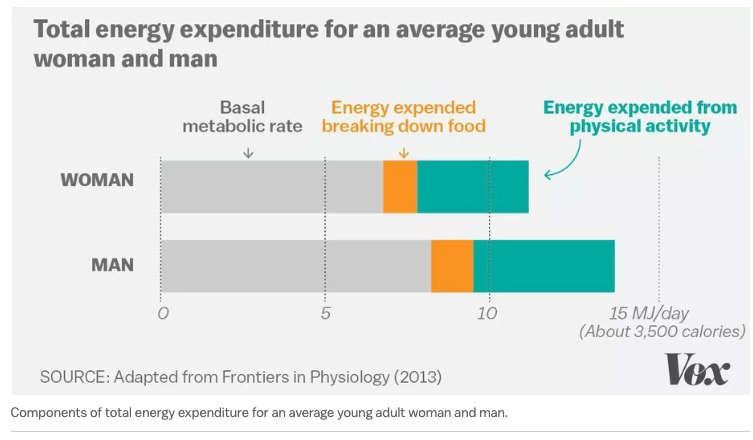|
SEARCH My Blog (Opens in new tab)
You might put it on though
How often have you read something like this "another way to lose more weight is to eat more protein"? An alternative version is this "boost your metabolism by increasing your protein intake".
And yet another version is "take a protein shake before bed and see your fat burn away as you sleep". Sorry to break the bad news, but eating more protein isn't going to help—no more than a walk around the block. A walk around the block will do you more good.
This whole idea is just another faddish approach to trying to solve a more straightforward problem. The enduring basics of healthy food intake are to:
If you cling on to the 1% fads and are continually disappointed by the lack of magical results, then you can lose hope. You also become distracted from the basics. Let's check out the facts about eating more protein as an aid to losing weight. Extracting the nutrients from food takes energy
The explanation behind this particular food fad is based on what's known as the Thermogenic Effect (TE). TE refers to how much energy our body uses to break down the food we eat.
The digestion of our food accounts for about 10% of our daily energy consumption. Protein requires more energy to digest than the same calorific load of fat or carbohydrate. So for the sake of argument, let's say that fat requires 10% of the calories consumed to digest it, carbohydrates 10%, and protein 25%. An average man has a basal metabolic rate (BMR) of around 1700 calories per day, while an average woman has a BMR of about 1400 calories per day. Add on 20% for activity, and the total energy consumption is 2040 calories for a man and 1680 calories for a woman. Food consumption, therefore, consumes 10% of those totals:
Let's see how the advice works out about eating more protein to lose weight. Scenario 1 - add in the shake to help lose weight
Scenario 1 is that you glug down a protein shake at bedtime. In this case, this is on top of your daily energy requirement - because it is going to burn away your fat, right?
Let's go all out and make that a high-protein protein shake with 36g of protein. This 36g of protein slides in at 36 X 4 = 144 calories. But the protein drink contains 280 calories because it isn't just protein. That's 280 - 144 = 136 calories of something, mainly carbohydrates. To lose weight by adding this protein to your bedtime routine, you have to burn away 280 calories. Your body, stimulated by this new meal, will happily use 25% of the 144 calories of protein in digesting it. That leaves 108 calories looking for a home. Of the other non-protein 136 calories supplied by the shake, 10% will be used to digest them. That leaves 123 calories. Add to those 108 calories left from the protein, the 123 calories left from the carbohydrates, and the "protein boost" has left 231 calories in your body. Standard dieting advice is that to lose 0.5kg a week that you should cut 500 calories a day from your food intake. Thus, in Scenario 1 - the extra 231 calories from the "weight-reducing extra protein" will add 0.5kg per fortnight, or 1kg per month. OK, well you might say that does not make sense. No one would just add it to their daily caloric requirement. So let's look at the other case. Scenario 2 - protein shake replaces other calories
Scenario 2 is where the extra protein is within the usual caloric requirement.
In this scenario the daily requirement of 2040 calories for men and 1680 for women includes the extra protein - let's say as a shake. The shake provides an extra 36g of protein, containing 144 calories. Twenty-five percent is used for digestion, leaving 108 calories. This is the best-case scenario for the advocates of eating more protein to lose weight because of the Thermogenic Effect. It is hard to get 36 grams of protein, and the extra amount consumed would generally be smaller, say 20g. Remember, the shake contains 280 calories. So for the total daily allowance of 2040 calories for men, and 1680 for women, 280 are from the extra protein intake. If these 280 calories were not part of the extra protein intake - for fat loss - they would consume 10% of their value being digested, i.e. 28 calories. Now, because those 280 calories include 36g of protein, the total calories consumed by digestion is as follows:
The difference is 9 minutes of housework
The difference between not having the extra protein and having the extra protein, say as a shake before bed, is 50 - 28 = 32 additional calories burned each day.
How much are 32 calories (calculated for a 60kg woman):
Get on with moving
You can draw your own conclusion.
Would you be healthier by adding a protein drink to your "weight loss" plan, or by adding an extra 6 minutes of brisk walking? As James Barnum sums up at "Why Eating More Can Help You Lose Fat" - "In conclusion, you don't really need to worry about any of this thermogenesis stuff." Exactly.
Follow me on Quora for more health and fitness tips.
If you enjoyed this article >> Follow me Leave a comment >> Share it >> Stay healthy If you have any questions email me and I will get back to you.  RSS Feed RSS Feed
Latest: get your free customised fitness plan designed uniquely for you.
|
ChoicesSince I was diagnosed at 50 with Type 2 diabetes I've been learning how to do bone-building fitness training which lowers my age. You can too. It's your choice. Walter Categories
All
Archives
May 2023
|





